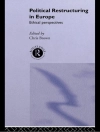Representative politics is in crisis. Trust in politicians
is at an all-time low. Fewer people are voting or joining political
parties, and our interest in parliamentary politics is declining
fast. Even oppositional and radical parties that should be
benefitting from public disenchantment with politics are
suffering.
But different forms of political activity are emerging to
replace representative politics: instant politics, direct action,
insurgent politics. We are leaving behind traditional
representation, and moving towards a politics without
representatives. In this provocative new book, Simon Tormey
explores the changes that are underway, drawing on a rich range of
examples from the Arab Spring to the Indignados uprising in Spain,
street protests in Brazil and Turkey to the emergence of new
initiatives such as Anonymous and Occupy.
Tormey argues that the easy assumptions that informed our thinking
about the nature and role of parties, and ‘party based
democracy’ have to be rethought. We are entering a period of
fast politics, evanescent politics, a politics of the street, of
the squares, of micro-parties, pop-up parties, and demonstrations.
This may well be the end of representative politics as we know it,
but an exciting new era of political engagement is just
beginning.
Inhoudsopgave
Acknowledgements vi
Introduction 1
1 Contours of a ‘Crisis’ 15
2 Locating ‘Representative Politics’ 37
3 Are We Becoming Unrepresentable? 59
4 Is the Party Over? 83
5 Citizens against Representation 105
6 Democracy after Representation 125
Notes 150
References 152
Index 160
Over de auteur
Simon Tormey is a political theorist based in the School of Social and Political Sciences. Prior to his appointment at Sydney in 2009 he was Professor and Head of the School of Politics and International Relations and founding Director of the Centre for the Study of Social and Global Justice (CSSGJ) at the University of Nottingham UK.












